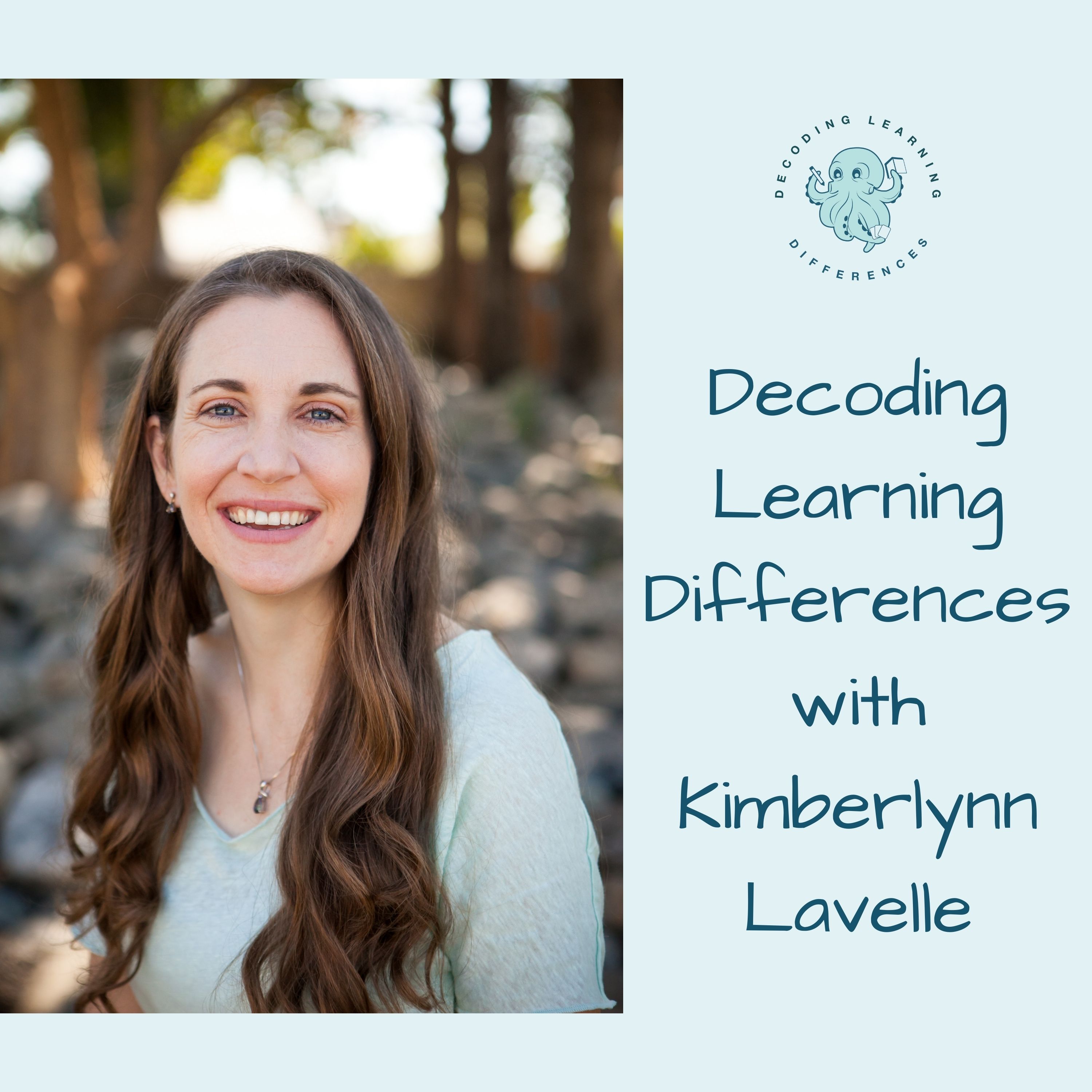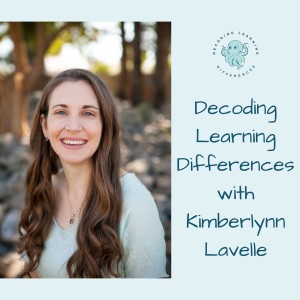

I teach parents how to educate their own children (especially those with struggling learners) so that they can successfully and peacefully homeschool or provide supplemental education at home. This podcast will discuss: - various learning disabilities and challenges, including: ADHD, dyslexia, autism, processing disorders, and so much more! - how all people learn - different learning styles - strategies for supporting specific learning challenges - how to apply these learning strategies at home - stories from homeschooling parents -interviews from other experts
I teach parents how to educate their own children (especially those with struggling learners) so that they can successfully and peacefully homeschool or provide supplemental education at home. This podcast will discuss: - various learning disabilities and challenges, including: ADHD, dyslexia, autism, processing disorders, and so much more! - how all people learn - different learning styles - strategies for supporting specific learning challenges - how to apply these learning strategies at home - stories from homeschooling parents -interviews from other experts
Episodes

Thursday Jan 30, 2025
2025 Season 5 Intro
Thursday Jan 30, 2025
Thursday Jan 30, 2025
Times are challenging, and I’m dedicated to focusing on getting everyone the info they need to be successful in the area in which I have expertise in.
There will be a few changes to the podcast for the 2025 season. I will now be emailing and publishing the podcast episodes on THURSDAYS instead of Mondays!
So watch for emails from me on Thursdays at 12:34pm. As much as I’d like to get back to weekly emails and episodes, I think bi-weekly is the most attainable for me at this time. I am dedicated to continuing to keep this a free resource (for you; it costs me plenty, haha!) and hope that you find it valuable!
I’ll be focusing this year on Education law (especially the special education side of it), book reviews, learning/teaching tips, and guest interviews!
If you have any ideas for any of the above OR any other questions you would love for me to answer on the podcast, please email me: Kimberlynn@DecodingLearningDifferences.com

Monday Nov 18, 2024
The Pace and Progress of Learning
Monday Nov 18, 2024
Monday Nov 18, 2024
Parents assume that their kids have learned something and will still know it next week.
They won’t, unless they’ve been practicing.
This is probably obvious to you when you stop to think about it, but it’s just so common for parents to also be surprised when our kids have forgotten something they TOTALLY knew!
And this learning-requires-practice truth is exponentially more true for kids with learning disabilities!
Listen to this week’s episode and get some ideas for how to go about helping your kiddo to make progress that lasts and doesn’t leave them saying, “I’m stupid!” No kid deserves to feel that way!

Monday Nov 04, 2024
Progress Check!
Monday Nov 04, 2024
Monday Nov 04, 2024
If you have a “great”, “good”, or even “okay” IEP in place for your kiddo, don’t assume all is going well and you don’t need to check in until the next annual IEP.
Check NOW! We’re approximately ⅓ of the way through the school year (depending on your school’s calendar).
We need to be sure that everything in place still makes sense and is benefiting your kiddo.
We need to be sure the goals are appropriate and progress is being made.
And we need to be sure progress is being made in all the areas that don’t have IEP goals too!

Monday Oct 28, 2024
Voting for Education
Monday Oct 28, 2024
Monday Oct 28, 2024
Unfortunately, education has become increasingly political lately and I feel like I’m not doing anyone any favors by keeping quiet about it.
I will not tell you who or what to vote for, but I would love the opportunity to let you know about a few things that can impact your child’s education.
I’m intentionally releasing this episode well ahead of Election Day because I want everyone to have time to research fully, and never to act out of fear.

Monday Sep 09, 2024
IEP Checklist
Monday Sep 09, 2024
Monday Sep 09, 2024
Today is Christmas in September! I’ve got a gift for you!
I’ve just created an IEP checklist to help you do what I do for my clients! When working with clients, I go through every part of an IEP to ensure it is well-written, accurate, and is working toward reasonably ambitious goals.
With this PDF, you can now do the same thing! The PDF links to videos that go deeper into some of these topics to help you better determine how to support your kiddo and how to best evaluate your kiddo’s IEP.
In this week’s podcast, I’m going over this PDF and how to use it most effectively.

Monday Sep 02, 2024
Letters to the School
Monday Sep 02, 2024
Monday Sep 02, 2024
Click here to see the video and get the letters!
https://decodinglearningdifferences.com/Letters
Or email me at Kimberlynn@DecodingLearningDifferences.com

Monday Aug 26, 2024
Starting the School Year Strong
Monday Aug 26, 2024
Monday Aug 26, 2024
See the video at: https://decodinglearningdifferences.com/StartingtheSchoolYear
The school year has already begun in schools near me, and won’t start for another month in some other schools around the country. Whenever you are starting school, I want you to keep in mind a few things toward the start of the year. These are some ways to help ensure this is a year of success and progress for your child, and not another lost year.
- Stay in frequent contact with all general education and special education teachers working with your kiddo, as well as any other service providers (Speech, OT, counseling, etc)
- Be sure that everyone is very familiar with your child’s needs and accommodations and be sure that they are actually implementing them, not forcing your child to be the one to ask for the accommodation before it is provided!
- Monitor your child’s progress and ensure IEP goals are being worked on, are still appropriate, and progress is being made.
- Be friendly, be approachable, be firm. The goal is for the school’s IEP team members to treat you like they would a close friend or family member, providing the best for your kiddo; not taking advantage of you, and not keeping you in the dark out of fear.

Monday Apr 22, 2024
IEP Accommodations: Evaluating a Real IEP
Monday Apr 22, 2024
Monday Apr 22, 2024
Video version available at:
decodinglearningdifferences.com/IEPAccommodations
This week’s podcast episode is long overdue! This is an analysis of a real IEP accommodations page sent to me by a parent concerned about their child’s IEP and wanting some free feedback.
I love parents who care and who ask great questions to understand how to help their kiddo.
In this episode, I take a look at this IEP for the first time and give feedback on what I’m seeing and noticing and what I would write differently, if anything.
Did you know??
If you want free support on an IEP, email me (Kimberlynn@DecodingLearningDifferences.com) and tell me, “free help, please!” Attach any IEP documents you want me to look at. I’ll take a look, remove any identifying information, and provide some feedback on a future podcast episode, sending you the episode before it’s published!
Or- Do you want more intensive help and guidance? Someone to hold your hand and guide you through more than a year of IEP process and ongoing monitoring and support? Email me (Kimberlynn@DecodingLearningDifferences.com) and say, “I want ALL the help!” and we’ll set up your 1:1 support.

Monday Apr 15, 2024
Positive Mindset with Sherrika Myers
Monday Apr 15, 2024
Monday Apr 15, 2024
I was watching a sweet video the other day of a toddler trying to figure out a puzzle and looking frustrated but determined. Finally, the child figured it out and their face lit up! So sweet!
I love these kinds of stories of kids, adults, and even animals overcoming difficulties. They can be such an inspiration!
And even better: when someone overcomes a difficulty and then turns around and helps others to overcome that same difficulty!
That’s this week’s guest on the podcast: Sherrika Myers!
You will hear her tell her story of difficulty, overcoming, and then creating ways to help others overcome that same difficulty AND other challenges!
Watch the video here:
https://decodinglearningdifferences.com/SherrikaMyers/
Links to Sherrika Myers's resources:
https://www.every1voicematters.org/

Monday Mar 25, 2024
IEP Goals: Let's Fix One!
Monday Mar 25, 2024
Monday Mar 25, 2024
Hi, *|FNAME|*! Happy Monday!
When I first became a special education teacher, I had received NO instruction on how to write an IEP. I asked another special education teacher how to write it and was told to mostly just copy what the previous year’s IEP said, just making the goals more advanced.
I was so clueless going into that first IEP meeting.
I cared DEEPLY about my students, and I wanted to do right by them.
I wanted to provide every student with a really great education that would meet their needs and see them excel.
I felt that parents were an important part of the team, knowing more than I did about their student and best positioned to address and suggest certain parts of the IEP.
I did not feel well-positioned to make suggestions on the rest of it…
A few years later, after talking to more special education teachers, receiving a little training, and writing and holding over a hundred IEP meetings….
I was still inadequate.
I still cared. I still wanted to do what was best. And I still felt like there was a ton I didn’t know and needed to know in order to best serve my students.
Eventually, I got A LOT more training and feedback from experts on how to actually write effective IEP goals.
I had someone over my shoulder showing me what was right and what I needed to change to write effective goals.
I will forever be grateful to that person and the training I received which allowed me to finally be better at that aspect of my career.
And now that I’m not writing hundreds of IEP goals every year as a special education teacher, I want to help others know HOW to write and recognize good IEP goals
When the IEP team sends you a draft IEP goal, I want you to be able to look at it and determine for yourself if it is any good.
Check out the video for this week’s episode: “IEP Goals: Let's Fix One!” by clicking here!